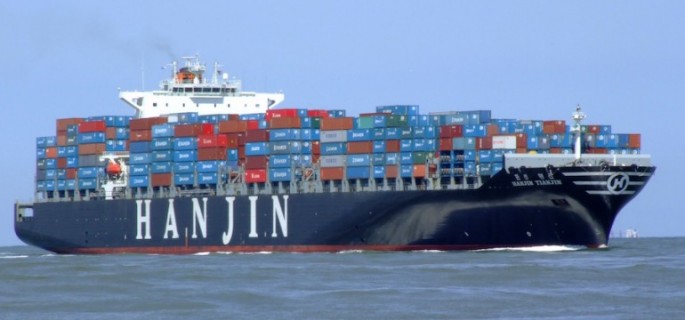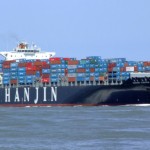Hanjin takes legal steps to prevent ship seizures as more vessels blocked

South Korea’s Hanjin Shipping plans to take legal action in jurisdictions worldwide to prevent its vessels being seized, as more of its ships were blocked from docking at ports in the wake of its collapse.
As of Monday, 79 Hanjin ships including 61 container ships and 18 bulk carriers have been denied port access, according to South Korea’s maritime ministry. That figure includes one vessel seized in Singapore by a creditor, a company spokeswoman said. Hanjin has 141 ships, of which 128 are operating.
At least three U.S. firms have also launched legal action against Hanjin to seize vessels and other assets over unpaid bills.
The collapse last week of the world’s seventh-largest container shipper has caused much agonizing among its clients over the fate of stranded cargo. Whether Hanjin can fend off ship seizures will depend on the jurisdictions involved, lawyers said.
Hanjin vessels are currently carrying cargo worth 16 trillion won ($14.5 billion) belonging to some 8,300 cargo owners, the Korea International Trade Association said, adding that the carrier has unpaid bills amounting to 610 billion won.
As part of its efforts to gain legal protection for its ships, Hanjin has filed a Chapter 15 petition in a U.S. bankruptcy court in New Jersey. It plans to pursue legal action in roughly 10 countries this week and later expand that to 43 jurisdictions, South Korea’s financial regulator said.
Many port authorities and port service providers are demanding cash to work on Hanjin ships, the Hanjin spokeswoman said.
Its lead creditor, the state-run Korea Development Bank, met with officials of parent firm Hanjin Group to discuss its commitment to paying fees so stranded ships can enter ports, but did not reach a conclusion, a bank official told Reuters.
Hanjin is likely to have more recourse against its ships being seized in countries which, like South Korea, have signed the United Nations-backed UNCITRAL Model Law on Cross Border Insolvency, which include the United States, United Kingdom, South Africa and Australia, legal sources said.
“If Hanjin’s vessels have been arrested in jurisdictions that have ratified the Model Law then there is a strong chance the arrest will not be successful, although with the caveat that this is always subject to the local practices and the factual situation,” said Steffen Pedersen, partner at law firm Thomas Cooper in Singapore.
Lawyers said it was more uncertain what would happen in jurisdictions such as Hong Kong, China and Singapore that have not signed the Model law.
Shares in Hanjin Shipping plunged 30 percent on Monday after trade resumed although they later recouped most of their losses on what appeared to be buying by retail investors. The stock has lost 34 percent since creditors halted their support last week.
The ship seized in Singapore, the Hanjin Rome, includes about 50 containers with components for a nuclear power plant under construction in the United Arab Emirates by a consortium led by Korea Electric Power (KEPCO), according to a person with direct knowledge of the matter.
The person, who was not authorized to speak to the media about cargo data, declined to be identified.
Hanjin accounts for 7.8 percent of trans-Pacific trade volume for the U.S. market and a Hanjin bankruptcy would be the largest ever for a container shipper.
Rival Hyundai Merchant Marine is in talks with firms such as Samsung Electronics and LG Electronics to carry their cargo, South Korea’s Financial Services Commission said on Monday.
Ratings agency Fitch said in a research note that Hanjin Shipping risks should be manageable for South Korea’s banks.
Source: CNBC




























